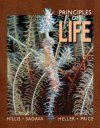About this book
Principles of Life cuts through excessive detail and factual minutiae to focus on what matters most in biology today. Principles of Life explores the essential biological ideas in the context of research data offering an active-learning approach.
Contents
PART 1: CELLS
- Introduction
- Life Chemistry and Energy
- Nucleic Acids, Proteins and Enzymes
- Cells: The Working Units of Life
- Cell Membranes and Signaling
- Pathways that Harvest and Store Chemical Energy
PART 2: GENETICS
- The Cell Cycle and Cell Division
- Inheritance, Genes and Chromosomes
- DNA and its Role in Heredity
- From DNA to Protein: Gene Expression
- Regulation of Gene Expression
- Genomes
- Biotechnology
- Genes, Development and Evolution
PART 3: EVOLUTION
- Mechanisms of Evolution
- Reconstructing and Using Phylogenies
- Speciation
- The History of Life on Earth
PART 4: DIVERSITY
- Bacteria, Archaea, and Viruses
- The Origin & Diversification of Eukaryotes
- The Evolution of Plants
- The Evolution and Diversity of Fungi
- Animal Origins and Diversity
PART 5: PLANT FORM AND FUNCTION
- The Plant Body
- Plant Nutrition and Transport
- Plant Growth and Development
- Reproduction of Flowering Plants
- Plants in the Environment
PART 6: ANIMAL FORM AND FUNCTION
- Physiology, Homeostasis, and Temperature Regulation
- Animal Hormones
- Immunology: Animal Defense Systems
- Animal Reproduction
- Animal Development
- Neurons and Nervous Systems
- Sensors
- Musculoskeletal Systems
- Gas Exchange in Animals
- Circulatory Systems
- Nutrition, Digestion, and Absorption
- Salt and Water Balance
- Behavior
PART 7: ECOLOGY
- Organisms in Their Environment
- Populations
- Ecological and Evolutionary Consequences of Species Interactions
- Ecological Communities
- The Global Ecosystem
Customer Reviews
Biography
David M. Hillis is the Alfred W. Roark Centennial Professor in Integrative Biology and the Director of the Center for Computational Biology and Bioinformatics at the University of Texas at Austin, USA, where he also has directed the School of Biological Sciences. He has taught courses in introductory biology, genetics, evolution, systematics, and biodiversity. He served on the National Research Council committee that wrote the report BIO 2010: Transforming Undergraduate Biology Education for Research Biologists. His research interests span much of evolutionary biology, including experimental studies of evolving viruses, empirical studies of natural molecular evolution, applications of phylogenetics, analyses of biodiversity, and evolutionary modeling.
David E. Sadava is the Pritzker Family Foundation Professor of Biology, Emeritus, at the Keck Science Center of Claremont McKenna, Pitzer, and Scripps, three of The Claremont Colleges, USA. In addition, he is Adjunct Professor of Cancer Cell Biology at the City of Hope Medical Center. Twice winner of the Huntoon Award for superior teaching, Dr. Sadava has taught courses on introductory biology, biotechnology, biochemistry, cell biology, molecular biology, plant biology, and cancer biology. For the past 15 years, he has investigated multi-drug resistance in human small-cell lung carcinoma cells with a view to understanding and overcoming this clinical challenge, and his current work focuses on new anti-cancer agents from plants.
H. Craig Heller is the Lorry I. Lokey/Business Wire Professor in Biological Sciences and Human Biology at Stanford University, USA. Dr. Heller is a fellow of the American Association for the Advancement of Science and a recipient of the Walter J. Gores Award for excellence in teaching. His research is on the neurobiology of sleep and circadian rhythms, mammalian hibernation, the regulation of body temperature, the physiology of human performance, and the neuro-biology of learning. Dr. Heller has done research on a huge variety of animals and physiological problems ranging from sleeping kangaroo rats, diving seals, hibernating bears, photoperiodic hamsters, and exercising athletes. He has extended his enthusiasm for promoting active learning through the development of new curricula and Virtual labs for physiology.
Mary V. Price is Professor of Biology, Emerita, at the University of California, Riverside and Adjunct Professor in the School of Natural Resources and the Environment at the University of Arizona. She has developed and taught general biology and ecology courses from introductory (majors and non-majors) to graduate levels. Her research focuses on understanding the ecology of North American deserts and mountains. She has asked why so many desert rodents can coexist, how best to conserve endangered kangaroo rat species, how pollinators and herbivores influence floral evolution and plant population dynamics, and how climate change affects ecological systems.



































